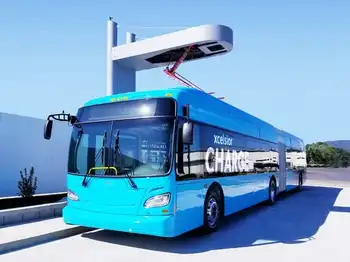Oklahoma Commission may discuss new rules
TULSA, OKLAHOMA - The Oklahoma Corporation Commissioners voted to pursue a formal process of evaluating whether to change the way it oversees utility fuel and electricity purchase contracts.
Goodyear Tire representative Joyce Mihalik joined representatives from about a half dozen other Oklahoma industrial power consumers to ask the commission for the changes.
"To produce competitively priced tires, we must be aggressive and diligent with regards to price," said Mihalik, a power purchasing agent for Goodyear's 14 North American tire plants.
Mihalik said the Lawton tire plant - Goodyear's largest in North America - has the highest electric rates of the 12 plants in regulated states.
"In a regulated market such as Oklahoma, we must rely on the electric company to purchase power on our behalf," Mihalik said. "I'm not suggesting we could do better or worse. But the point is we are required to bear the costs, yet we do not have a part in the process. We want to make sure the dollars passed on to customers are fair and reasonable. We believe that can be improved upon with input from knowledgeable shareholders."
A coalition including the attorney general's office, the Oklahoma Industrial Energy Consumers and independent power producers proposed a set of rules that include requirements that the electric utility's power and fuel purchases be more transparent and open.
The proposed rules call for the power companies to accept bids and buy their power in weekly contracts. Most of the purchases are on a daily or hourly basis.
Bill Bullard, an attorney for Oklahoma Gas and Electric Co., however, said such a plan would have cost OG&E customers up to $1.4 million a week for much of last summer, which was far cooler than expected.
"I'm not saying that will happen again, but I'm saying that's indicative of how a quickly changing process can negatively affect ratepayers," he said.
Bullard said OG&E supports some rule changes, but disagrees with many of the suggestions in the consumers' proposal.
The commissioners delayed a debate on whether to declare an emergency rule change. If such a declaration is made, the commission could bypass many of the procedural delays and send a proposal to Gov. Brad Henry as soon as they are ready.
The governor then would have up to 45 days to approve the changes, which would become effective immediately.
If the commissioners choose not to evoke the emergency clause, the rule changes would have to be approved by the Legislature, which has concluded its 2005 regular session and probably would not consider the changes until 2006. If approved, the changes likely would go into effect 90 days later, meaning two summer seasons would pass before they are approved.
Assistant Attorney General Bill Humes said soaring natural gas prices constitute a public interest, but Commissioner Jeff Cloud questioned the opinion. "Is it an emergency that the Legislature is out of session?" Cloud asked.
The commissioners said they likely will revisit the emergency clause issue at a later date.
Related News

Ermineskin First Nation soon to become major electricity generator
RED DEER - The switch will soon be flipped on a solar energy project that will generate tens of thousands of dollars for Ermineskin First Nation, while energizing economic development.
Built on six acres, the one-megawatt generator and its 3,500 solar panels will produce power to be sold into the province’s electrical grid, providing annual revenues for the band of $80,000 to $150,000, depending on energy demand and pricing.
The project cost $2.7 million, including connection costs and background studies, said Sam Minde, chief executive officer of the band-owned Neyaskweyahk Group of Companies Inc.
It was paid for with grants…




